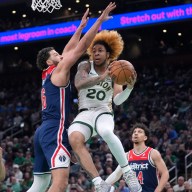 Filmmaker Steve James (“Hoop Dreams”) made “Life Itself,” a documentary about film critic Roger Ebert.
Filmmaker Steve James (“Hoop Dreams”) made “Life Itself,” a documentary about film critic Roger Ebert.
Credit: Magnolia Pictures
Chief among the people filmmaker Steve James can thank for his esteemed career is Roger Ebert. With television cohort Gene Siskel, the film critic championed his 1994 documentary “Hoop Dreams,” creating awareness for a tiny, three-hour film following hopeful professional basketball players from low-income parts of Chicago. James’ latest is “Life Itself,” a documentary he made about Ebert’s life and final months. And yet shockingly, the two weren’t close.
“I met Roger 20 years ago in the wake of ‘Hoop Dreams,’” James recalls. “And I probably saw Roger and Chaz [his wife] less than 10 times in those 20 years.”
Though there have been periods in history when critics and artists were close friends, it’s generally understood there’s a professional wall between the two professions. “I was careful about those boundaries. I would send him an email when I had a film coming out. They would be this long,” he says, two fingers close together. “If you’ve seen my emails you know hard that is because I wrote emails like that,” gesturing a wide chasm between his hands.
That changed when he read “Life Itself: A Memoir,” Ebert’s 2010 book about his life, especially in the wake of a cancer that would take a large chunk of his jaw, robbing him of his speaking voice. Ebert was initially reluctant to be in a movie, but James pitched it as one that both adapts his book and hangs with Roger and Chaz.
Ultimately, he says, not being close to Roger made “Life Itself” a better film. “I would have been more protective of him in some ways. When people are criticizing him I would perhaps disagree with them and not put them in the movie,” James says. “It allowed me to show his life with a level of candor that would have been harder if I had been a close friend. I wanted to make a distinction between doing a film that’s admiring of him and doing a film that’s hagiography.
Still, he regrets he wasn’t closer with Ebert: “When I interviewed [‘El Norte’ director] Gregory Nava and saw that deep friendship they had —I think ultimately it would have been great to have that relationship.”
 The old televised movie debates between Gene Siskel and Roger Ebert are some of the many sights in Steve James’ Ebert doc “Life Itself.”
The old televised movie debates between Gene Siskel and Roger Ebert are some of the many sights in Steve James’ Ebert doc “Life Itself.”
Credit: Magnolia Pictures
Despite the barrier that keeps artists and critics in separate playpens, many filmmakers befriended and respected Ebert, among them Martin Scorsese, Werner Herzog and Ramin Bahrani — all close friends. James was an admirer as well.
“He was the kind of critic who really gets films — he gets what filmmakers are trying to do,” James says. “They might not succeed, and he’ll point that out. But he gets what they’re trying to do, and a lot of times he had insight into what you were doing that you didn’t necessarily realize you were doing.”
That doesn’t go for all critics. “I’ve read good reviews of my films that I didn’t think were particularly smart. But I’ll take them, because they’re good,” he says. “And I’ve read bad reviews that were smart. I don’t much like them. But I do remember them.”
Ebert, he says, avoided an inevitable trap of the profession. “You watch a lot of movies, and you start to go in thinking, ‘OK, prove it to me,’” he says, making a weary face. “If I was a critic that’s the way I would be. I’m kind of that way anyway. But Roger went into a movie wanting to love it. That’s where he started from. If he didn’t love it, then my condolences. But he started from there, and underlying all of his criticism was a feeling of profound love, and an understanding of how hard it is to make a good movie.”
Read our interview with Chaz Ebert. Our review of “Life Itself” is here.
Follow Matt Prigge on Twitter @mattprigge
















